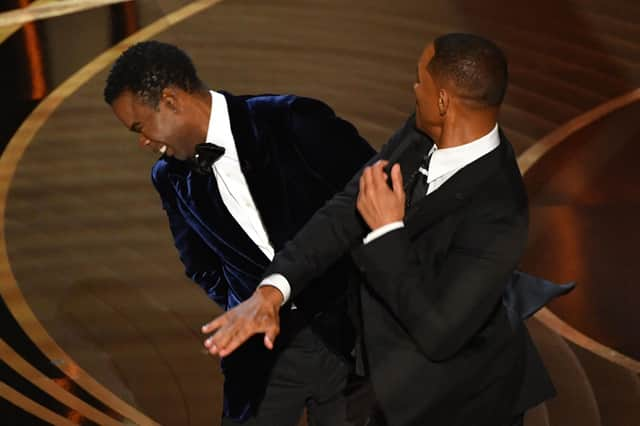Will Smith slaps Chris Rock: Apologists for violence and bystanders who do nothing are part of the problem – Karyn McCluskey


In the midst of war in Ukraine, Yemen and other conflict zones and horrendous cases of assault and murder in Scotland, the wider UK and internationally, you would think people would understand the difference between right and wrong, that there would be no apologists for violence, but here we are.
The power of walking away, removing oneself from a situation, makes a potent statement of a person in control, who recognises the importance of interrupting a series of events and not engaging. That’s not to say it’s easy.
Advertisement
Hide AdAdvertisement
Hide AdAfter decades of work with people affected by violence, I have heard so much about environments where it is normalised, how challenging it is to walk away, and the toxic norms of how to be a man.
This is ingrained but I’ve seen change in Scotland. Amazing work by people like Fare in Easterhouse create incremental steps that lead to great change.
If Will Smith and his wife Jada had walked out of the Oscars, had he accepted his Oscar from a separate room – we would have been discussing what it is to be a role model. That would have been a display of real power.
Instead, we might see a very public restorative justice in action, where a harm is acknowledged and the person harmed is in control and at the heart of the process. As with all wrongdoing, the damage is done, and he will have to deal with the ramifications for many years to come. The internet alas never forgets nor forgives.
Just as interesting are those who sat passively by, ignoring what had happened. Some were afraid, some shocked and frozen, but the ‘bystander effect’ is a whole lot more complex than that.
In 1964, a young woman called Kitty Genovese was murdered in New York. It transpired that a number of people witnessed the attack or heard Ms Genovese calling for help, but failed to act. The number of witnesses is disputed, but it gave rise to the term.
The more people present, the less likely any are to help someone in need. Each person thinks someone else will act, and so no one does. The crowd means no individuals have to take responsibility for their lack of action.
Work in schools on the important role of bystanders shows great promise, giving people the skills to address toxic behaviour, bullying and violence in a safe way.
Advertisement
Hide AdAdvertisement
Hide AdWhen I go to speak in schools I am overawed by the young people I meet: smart, thoughtful, engaged and much more aware of their impact on the world than I was at that age.
When I speak to them about violence, most understand their role in leading the change. Some of the young people have home lives riven with trauma and they, more than most, embrace the need to feel safe and violence-free and the tools to do so.
There is a saying that the standard you walk by, is the standard you accept. Our young people give me hope of a world where violence is never acceptable.
Karyn McCluskey is chief executive of Community Justice Scotland
